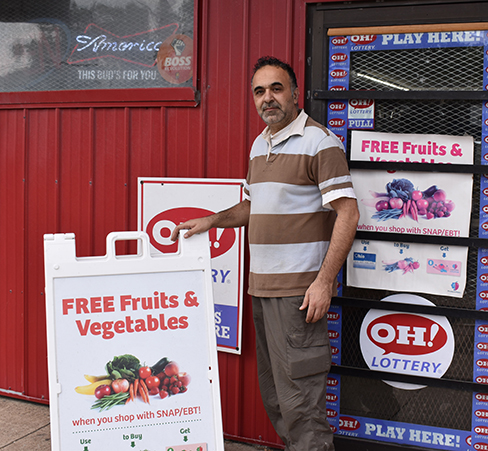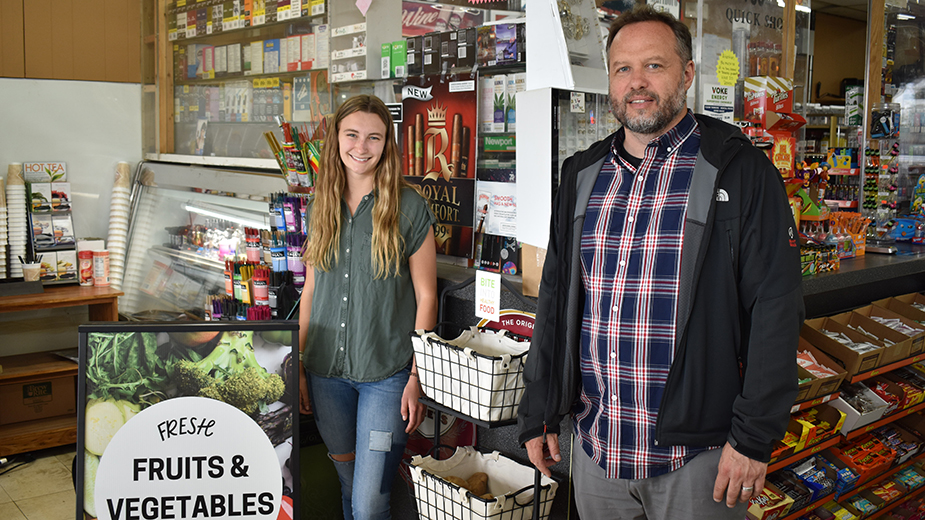WARREN – In a dozen convenience stores in Warren, the snack foods, beer and cigarettes are joined by fruits and vegetables, courtesy of a Trumbull Neighborhood Partnership initiative.
The Healthy Community Stores program grew out of a 2017 food security strategic plan, the executive director of TNP, Matt Martin, says. Among the issues articulated was that the southern half of the city was “a food desert by any metric or measure,” lacking any full-service grocery stores, he says, and two-thirds of the city fell into that category.
TNP initially took on the problem with initiatives such as farmers markets and urban agriculture programs. They proved popular and valuable but not enough to “move the needle,” Martin says.
At one point, the idea of partnering with neighborhood convenience stores was considered but rejected because they focused on items such as lottery tickets, tobacco products and junk food and their owners “just weren’t going to be an ally,” he says.
TNP revisited the concept after talk of luring a larger grocery store to the area faded because the idea didn’t seem like “a good use of our time,” he says. Looking at best practices in other areas, the TNP staff realized that the city has 44 sites that accept Supplemental Nutrition Assistance Program and Electronic Benefit Transfer payments.
Many of them had the necessary store infrastructure in place and were in underserved neighborhoods. Not all of them would be allies. But even if some of them were willing to work with TNP, “then we don’t need to reinvent the wheel,” Martin says.
“We realized [the value of] using businesses that are already here instead of trying to invent your own thing or convincing a chain corporation to come in,” TNP food access coordinator Lydia Walls says. Her focus is on working with small businesses and encouraging them to consider the health of their customers and “kind of empowering them to see themselves more as a community center.”
TNP’s efforts to provide an incentive to convenience stores to carry fruits and vegetables include providing shelving and even refrigeration units, as well as marketing assistance, Walls says. Store owners are encouraged to display produce at the front of their stores near the register.
Funding sources include the Community Foundation of the Mahoning Valley, which provided $50,000 annually for three years for Walls’ position and the program, as well as $25,000 from the Ohio Finance Fund for store façade improvements and $5,000 from United Fresh Start to launch a produce voucher program for children, Walls says.
Much of the early effort is focused on “getting the vendors to understand that they can make money selling produce,” Martin says, which can take a couple of years.
“That’s where Christian [Bennett-Mosley, healthy retail access coordinator,] and Lydia have spent a lot of time building those relationships, getting them interested,” he says.
At minimum, most stores participating in the program carry basic grab-and-go fruits such as bananas, apples and oranges, Walls says. Several also have done well with potatoes, onions and other vegetables. Annual produce sales through the program stand around $10,000, she estimates.
One of the 12 stores participating, Lucky 7 Food Market, 1265 E. Market St., began carrying local produce about two years ago. Just recently, TNP supplied it with a $2,650 refrigeration unit to stock fresh fruits and vegetables.

Storeowner Mike Aleker says he likes new ideas and had space available in his store when TNP approached him.
Lucky 7 gets several customers who walk in from the surrounding neighborhood. He tries to price items so they don’t feel like they have to drive elsewhere. The previous day, a customer had stopped in near closing time to buy lettuce.
“She was happy because she didn’t have to drive to a bigger store,” he says. He also distributes coupons to purchase fruits and vegetables TNP provides to SNAP-eligible customers based on how much they spend. Local students also receive coupons they can redeem at the store for healthful snacks.
About six months ago, another Warren store, 960 Quick Stop, 960 Mahoning Ave. NW, began offering fruits and vegetables through the program. Like Lucky 7, the store has many customers who walk in to pick up groceries. So having the fruits and vegetables there is convenient for them, store manager Ashley Reeves says.
Response to the program has been good. “They seem to be liking the vegetables more than the fruits lately,” she says.
TNP continues to provide access to fresh food through its weekly farmers market, which is marking its 10th year.
“People have learned to appreciate the local food system since COVID,” says the community programs coordinator, Sevasti Tripoulas.
Vendors at the Warren Farmers Market, held near the Warren Community Amphitheatre, include Sarah Thomas, who manages the Warren Grown community farm on the southwestern side of Warren.
“We grow produce that we make available for the community for donation-based prices,” Thomas says. Among fruits and vegetables grown at the farm are tomatoes, strawberries, kale, okra, beans, squash and corn.
The nonprofit organization is running a summer program to teach youth about urban agriculture and how they can use plants for medicinal and even artistic purposes. Another objective is to get the word out about the importance of locally grown food.
“We’re very vulnerable in regard to our food chain and food supply,” Thomas warns.
Elliot Lengel, who with his brother, David, has a farm in Mercer, Pa., also sets up at the market in Warren.
“We grow probably around 50 acres of vegetables,” he says. There is a big difference between what is available in a grocery store and locally grown produce in terms of freshness, he maintains.
“The idea of getting fresh produce is really what brought me out,” says Candice Castro of Hermitage, Pa. “We’re trying to eat healthier.”
Transportation can be a problem for some Warren residents when it comes to getting food, says Carol Cambridge of Warren. She drives people to the farmers market for her church, Second Baptist Church in Warren.
“Quite a few are senior citizens, and then we have young mothers with children,” she says.
TNP spent a lot of time trying to get as many retailers as possible in the community stores initiative. Martin anticipates shifting the program’s emphasis to keep the current participants engaged.
“We are trying to figure out how to make this go over a long period of time because it can be tricky,” he says.
Stores can choose to carry produce but if they’re not making much money, it’s easy to “fall off,” Walls says. The plan is to more regularly engage with stores in the program to make sure they have what they need to be successful.
Some stores have said that even if TNP ceased to exist they would stick with the program.
Pictured at top: Lydia Walls, food access coordinator, and Matt Martin, executive director of Trumbull Neighborhood Partnership, visit 960 Quick Stop convenience store in Warren, a participant in TNP’s Healthy Community stores program.
